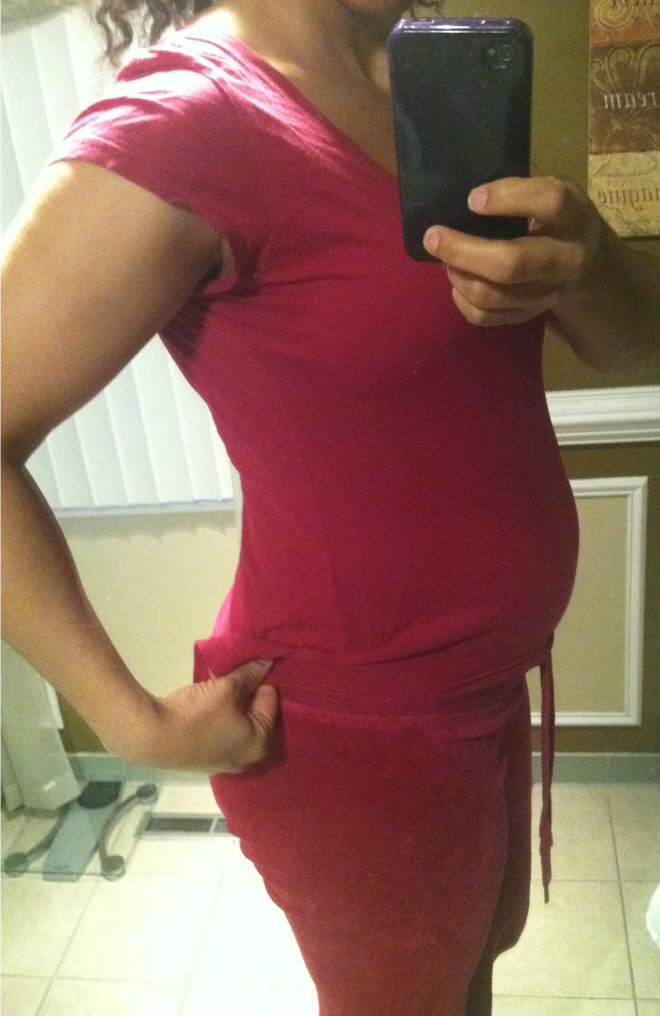
by EM2WL | Jul 14, 2012 | Increasing calories, Metabolism Reset
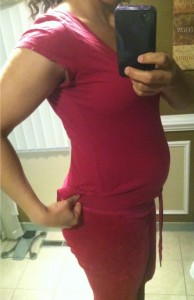
Expecting? Nope, Kiki’s just bloated again
Making the decision to do a metabolism rest is no small matter. The mental transition just to decide to “eat more” is already hard enough when coming from a lifestyle of severe calorie restriction. Most are already scared out of their mind at the thought of blowing up from the extra cals, and typically can’t imagine eating that much food without wanting to puke.
Others may not have those thoughts upfront. They are ecstatic at the thought of more food, and begin salivating right away what items will be added back that they’ve been denying themselves up until this point. They immediately have visions of bread and ice cream, and living happily ever after.
Regardless of how one arrives at the point of beginning their reset, once they dive in and get a few days or weeks in, the question inevitably pops up:
Why am I so bloated?
Sometimes it’s more like, “OMG!! I hate you! I knew this would happen! I can’t believe I fell for this crap! EM2WL is a crock! I can’t button my pants! This sucks! I’m up 17lbs from last week! You better hope we don’t meet in a dark alley, I’m gonna $%&*%$#@@$%^&*(*&%$#@##$^&&%!”…
You get the point. The dreaded bloat/”gain” arrives, and we freak.
When we drastically increase cals, we have to realize that we are asking our bodies to work overtime processing more food that it has in who knows how long. We are also possibly re-introducing foods that we had given up and could have become allergic/sensitive to because of eliminating them from our diet (whether born out of necessity or fad). Increasing our intake of known bloat offenders, only exacerbates this problem, making us think that “it’s not working!” or one of the other lines quoted above.

Lucia enjoying some creamy goodness
The biggest plus of the EM2WL lifestyle is the time factor. You have it, and lots of it. We encourage members to take this time to become in tuned with your body. Learning how your body reacts to different foods, exercises, etc., is one of the most valuable tools that you will have on your journey. Use this time to log your food, as well as the different things that are happening in your body each day. Begin to connect the dots with days/times that the bloating seems overwhelming and what you ate the day/meal prior. This does not always mean that you will have to omit the item from your diet, rather that you will want to take your time increasing that particular item until your body has fully stabilized. Of course, if you notice a reaction so severe (i.e. allergic) that you feel is not worth the risk, then you can feel free to remove the offender from your diet. But you will likely find that given enough time, and with a few simple tweaks, your body can and will adapt to most food items again.
If you are dealing with the “Reset Bloat” or want to prevent it, here are a few tips that can help:
- Add carbs slowly. Regardless of if you’ve just come off Atkins or were already pretty carb heavy, carbs, in general are prone to bloating when eaten in excess, and when calories are almost doubling (in most cases), your body sees it as excess (at first). So take it slow.
- Add dairy products slowly, for the same reasons as the carbs, this includes protein powders.
- Begin with a bit higher protein ratio, protein makes the body to secrete water, thus controlling bloating. Each time you take the carbs up a notch, you can lower the protein a bit more. Continue in this manner until stabilized.
- Drink enough water. Bloat is one of those times you have to fight fire with fire. The more water you retain, the more you need to drink. Eating foods with diuretic properties can also help (i.e. asparagus, green beans, green tea, etc)
- Reduce your cardio. Where does this one fit in the middle of all of this food talk? Believe it or not, excessive cardio is actually a main contributing factor to poor digestion, as it reduces the acid in the stomach that breaks down food, as well as naturally forming digestive enzymes. When the stomach cannot digest properly, larger food particles are left in lower in the digestive tract = BLOATING. It’s time to cut back, peeps.
- Replace heavy cardio sessions with exercise that will stimulate and retrain your nervous system (thus restoring what digestive functions that the intense/excessive cardio has torn down). Do light stretching, or try a restorative yoga class or DVD. This is not the time for power yoga, but a light relaxing session or even a tranquil walk outdoors. Continue (or begin) weight training, but keep the durations shorter, with longer rests (not circuits). The routines provided in New Rules of Lifting for Women
 are fine.
are fine.
- If you’ve been on a very low fat diet, you will want to introduce some essential fats into your diet as well (i.e. salmon, flaxseed, olive oil, etc).
- You’ll want to get some good supplements in your arsenal as you assist your body on this road to recovery, such digestive enzymes, probiotics, etc., as well as specific vitamins to help repair the digestive functions. These will greatly decrease the bloat factor. If you are at a loss for what supplements to use, feel free to check out our Amazon Store, for the supps that we recommend.
As usual, this is not an all inclusive list, but some very general guidelines that should help you make it through your reset without wanting to shoot yourself…or us.

by EM2WL | Jul 12, 2012 | Consistency, Metabolism Reset
 If you’ve been a chronic low cal dieter, and a follower of EM2WL for any length of time, then you know that we highly recommend doing a metabolism reset. Maybe you’re even doing one now, or planning to soon join the growing number of members who have decided to take back control of their lives from extreme caloric bondage. We all come to the point of metabolism resetting for different reasons. Some of us have actual diagnosis of an ED, and others have just been dieting longer than they care to remember. Our common ground: we have been starving ourselves by eating less food than our body requires to survive. Choosing the path of reset is one of the best things that we can do to recover from the mental and physical damage that occurs with long term, severe caloric restriction, but it is not an overnight process. A question that is popping up almost daily in our inbox is: How do I know when my metabolism reset is over?
If you’ve been a chronic low cal dieter, and a follower of EM2WL for any length of time, then you know that we highly recommend doing a metabolism reset. Maybe you’re even doing one now, or planning to soon join the growing number of members who have decided to take back control of their lives from extreme caloric bondage. We all come to the point of metabolism resetting for different reasons. Some of us have actual diagnosis of an ED, and others have just been dieting longer than they care to remember. Our common ground: we have been starving ourselves by eating less food than our body requires to survive. Choosing the path of reset is one of the best things that we can do to recover from the mental and physical damage that occurs with long term, severe caloric restriction, but it is not an overnight process. A question that is popping up almost daily in our inbox is: How do I know when my metabolism reset is over?
We’ve avoided answering that question for quite sometime, much to the aggravation of most. We hated even giving the “6-8 week” guidelines, because, quite honestly, 6 weeks may not be enough for some, too long for others. At EM2WL, we are always stressing that everyone is different. We are individuals. Some people bounce back quicker than others. Yet, there are still those of you wanting specific deadlines, and exact “stopping” times.
Whether you’re at the beginning of your journey, still on the fence, or well on the road to recovery, there are things to keep in mind along the way:
Mental recovery
I mention this one first because it is the area that controls all remaining points:
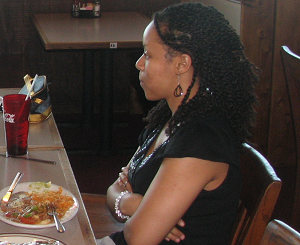 If you are not recovered mentally, then whether it’s been 6 weeks or 16, you are NOT finished resetting. We give “guidelines” for how long to reset, but your body does not magically know that it’s been 5 weeks and 6 days, thus resetting on the 7th day. Take this time to understand why you are resetting in the first place.
If you are not recovered mentally, then whether it’s been 6 weeks or 16, you are NOT finished resetting. We give “guidelines” for how long to reset, but your body does not magically know that it’s been 5 weeks and 6 days, thus resetting on the 7th day. Take this time to understand why you are resetting in the first place.
- If you are rushing to finish your reset, because you just want to “get it over with” or “hurry up and start cutting” because you “just need to get this weight off”…you have not mentally recovered, and should honestly consider continuing your metabolism reset. When your reset is over, you just know. You completely comprehend that this is your new way of life, and that you will NEVER go back to low cal madness, no matter how long it takes.
- If 1200-1400 cals is still an option in the back of your mind somewhere, you have not recovered.
Expectations
 Most of these are discussed in the post on patience, yet it still seems like we dive into the reset with unrealistic expectations of what will happen to us. Or, we say that we understand, but we don’t, really. We want to ride out the reset without a hitch and then hop on the cutting path and live happily ever after. Once again, this is when the mental aspect comes into play. That is our old “quick fix” diet mentality creeping in and telling us that if we eat too much, we’ll gain, going backwards and then we’ll NEVER get this weight off. So we go through our reset never fully allowing ourselves to relax and recover, because we’re so busy stressing about the .03265 gain on the scale that is about to happen in 5 minutes. Recall how many times that you have yo-yo’d in the past, or regained the weight after reaching “goal” because you used unhealthy methods to achieve the goal. Remember that if you don’t gain now and fully recover, you will likely gain it later, going back to square one, still with a shoddy metabolism.
Most of these are discussed in the post on patience, yet it still seems like we dive into the reset with unrealistic expectations of what will happen to us. Or, we say that we understand, but we don’t, really. We want to ride out the reset without a hitch and then hop on the cutting path and live happily ever after. Once again, this is when the mental aspect comes into play. That is our old “quick fix” diet mentality creeping in and telling us that if we eat too much, we’ll gain, going backwards and then we’ll NEVER get this weight off. So we go through our reset never fully allowing ourselves to relax and recover, because we’re so busy stressing about the .03265 gain on the scale that is about to happen in 5 minutes. Recall how many times that you have yo-yo’d in the past, or regained the weight after reaching “goal” because you used unhealthy methods to achieve the goal. Remember that if you don’t gain now and fully recover, you will likely gain it later, going back to square one, still with a shoddy metabolism.
- Expect to gain weight. You are recovering from an ED (or similar mindset), it’s part of the rehab process. If the weight came off in an unhealthy manner, you will likely HAVE to gain it back (whether in water, or replacing atrophied muscle/essential fat) as part of the recovery. Couple that with the zillion other reasons for scale fluctuations (especially in women), and you have a recipe for seeing the scale move up. Expect the gain.
- Expect the mental struggle that comes with that gain.
- Expect that you will have to find ways to deal with it.
- Expect to deal with bloat when you lift weights, or eat a lot of sodium, carbs, dairy, wheat, etc., as your body adjusts and tries to understand what’s going on.
- Expect that people around you will not understand what you are doing.
- Expect to lean on others who do understand for support.
- Expect to eventually gain full confidence in what you are doing.
- Expect to come out of this victorious.
- Expect that any weight gained will come off.
- Expect to never starve yourself again.
Stay Strong
 We’ve never said the the metabolism reset would be easy, but we guarantee that it will be worth it. Quick fixes don’t.work.period. Take this time to set healthy habits and goals for yourself, that will support and affirm your new lifestyle.
We’ve never said the the metabolism reset would be easy, but we guarantee that it will be worth it. Quick fixes don’t.work.period. Take this time to set healthy habits and goals for yourself, that will support and affirm your new lifestyle.
- Don’t focus on how “much longer” your journey will take, but on the fact that you are finally on the right path. Yes, you have a long journey ahead, so try to keep a realistic perspective.
- Get involved with the EM2WL community for support, and make a determination to do what’s best for your body.
- Hire a personal trainer and learn your way around the weight room. Set a new lifting goal, if you’re a vet. Try out a new workout class or DVD.
- Stop reading magazines or watching television shows (or listen to friends!) that promote unhealthy body images or rapid methods of weight loss.
- Read books (including cookbooks) and articles that teach you how to be strong, healthy and fit, without being extreme. Our Resources page is a great place to start.
- Focus on changing types of food you eat. You have time to make healthier habits, so use it. Add real foods back to your menu. Cut out diet drinks/food/artificial sweeteners that you’ve always known were bad for your health, but you were willing to sacrifice for lower calories.
- Buy clothes that fit and flatter you now. This does not mean resign yourself to a life of being fat, but simply not waiting to get to a “perfect size” before allowing life to begin. It wasn’t until I finally stopped dwelling on where I wanted to be and focused on looking my best in the present, that things came together for me. There’s a difference between being “focused” and being “obsessed“ (more on that in this post).
- Enjoy where you are on the way to where you are going. Rushing the process and running through every stop sign and red light may get you there faster, but it may also land you in the ER.

Parting words:
Fuel your body properly. Enjoy your life now. Don’t stress. The results WILL come.
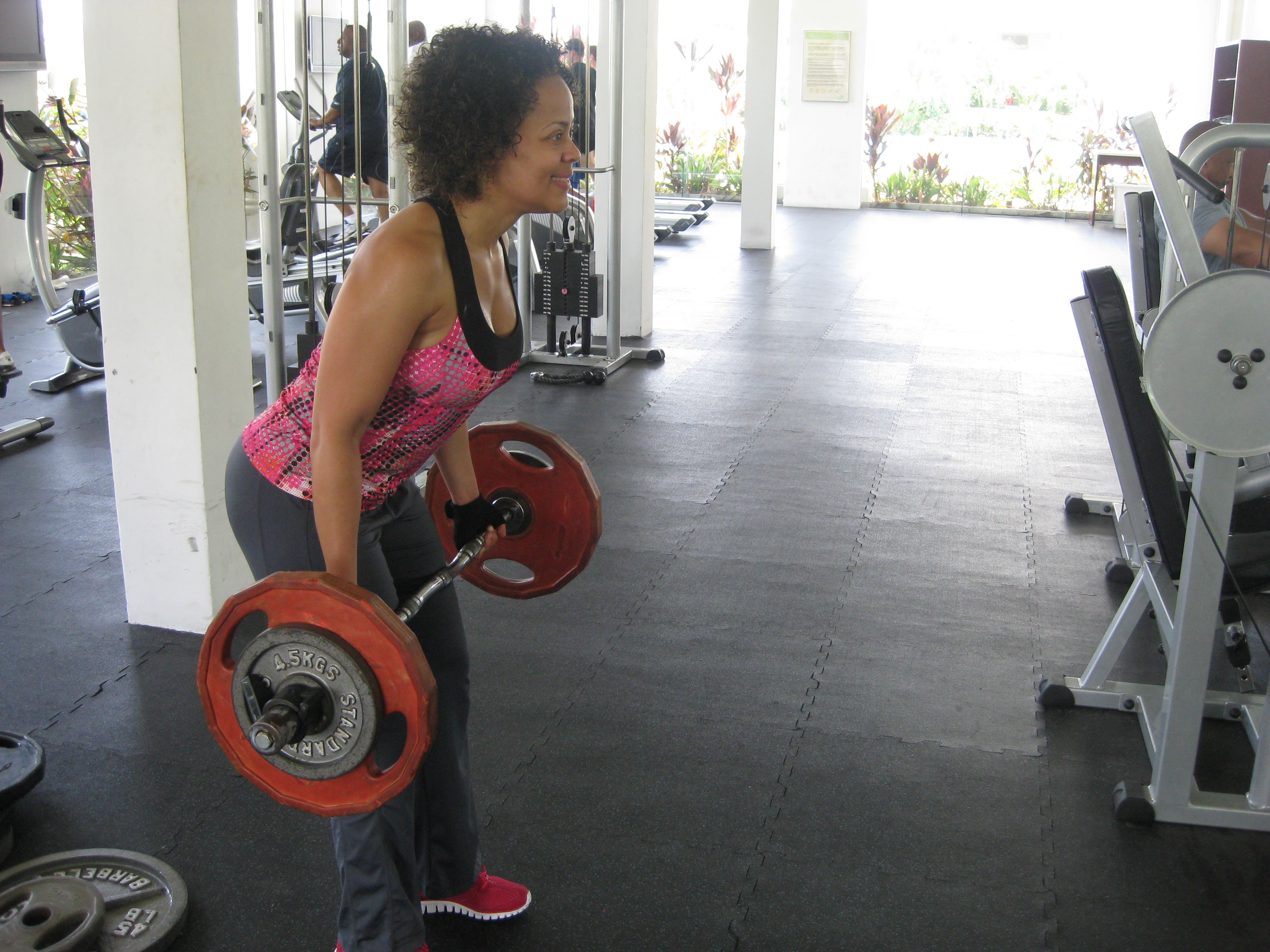
by EM2WL | Jul 11, 2012 | Building Muscle, Fat Loss / Cutting, Fitness Cycles (Periodization)
 A common thread that I find as I engage on different fitness/diet forums, and even conversations with friends and family, is randomness. One particular area of confusion seems to be with fat loss and training goals. I often have women (and a few men!) tell me that because they are in a fat loss phase they don’t need to lift weights, or at least not heavy ones. For some reason there has been a general consensus over the years, that the only way to “cut” is to ditch the heavy weight and move to strictly circuit routines and 3lb Barbie weights, while OD’ing on cardio. While the addition of a little cardio can certainly assist in fat burning, I think that somewhere along the line confusion has set in as to methods on how to cut (aka shed fat).
A common thread that I find as I engage on different fitness/diet forums, and even conversations with friends and family, is randomness. One particular area of confusion seems to be with fat loss and training goals. I often have women (and a few men!) tell me that because they are in a fat loss phase they don’t need to lift weights, or at least not heavy ones. For some reason there has been a general consensus over the years, that the only way to “cut” is to ditch the heavy weight and move to strictly circuit routines and 3lb Barbie weights, while OD’ing on cardio. While the addition of a little cardio can certainly assist in fat burning, I think that somewhere along the line confusion has set in as to methods on how to cut (aka shed fat).
When cutting, you won’t purposely be lifting lighter (I hope!), though, you may lighten the weights (slightly) on occasion to accommodate for moving faster in certain workouts, when applicable. It is harder to lift heavy during circuit work (if you choose to incorporate such workouts), but that does not mean you drop the 30# and head for the 3#. Because cutting is all about the eats, a person who is in a caloric deficit for any length of time may begin to lose strength, thus having to lower the poundage. This is, again, only as low as necessary to complete the amount of reps, yet still hitting failure toward the end of the set.
 Many men (and some women!) even take it a step further and NEVER want to cut, feeling it will undo all of their muscle building efforts. They’ve heard that muscle loss comes with cutting territory, and they fear it almost as much as the ladies fear the fat gain that comes with bulking. While this is true, it is the same that I addressed in the post on fat gain when bulking, these “side effects” are minimal when done correctly, and neither will “undo” the other unless we go too “extreme” in either phase (meaning grossly over eat in bulk w/minimal activity or grossly under eat in cut w/too much activity). If we are careful not to hit extremes, there are only a few tweaks here and there needed that will allow us to receive benefits from both phases.
Many men (and some women!) even take it a step further and NEVER want to cut, feeling it will undo all of their muscle building efforts. They’ve heard that muscle loss comes with cutting territory, and they fear it almost as much as the ladies fear the fat gain that comes with bulking. While this is true, it is the same that I addressed in the post on fat gain when bulking, these “side effects” are minimal when done correctly, and neither will “undo” the other unless we go too “extreme” in either phase (meaning grossly over eat in bulk w/minimal activity or grossly under eat in cut w/too much activity). If we are careful not to hit extremes, there are only a few tweaks here and there needed that will allow us to receive benefits from both phases.
It’s the extreme combo of cardio/deficit eating that will possibly cause muscle catabolization. Muscle is extremely hard to build on women, so we have to take extra care when doing the things that oppose muscle growth (i.e. eating in a deficit, doing excess cardio). It’s basically the equivalent to eating cheesecake and a diet coke, or a salad w/a milkshake (or any of the other quirky things that we do where one thing we’re doing is cancelling out the other)… So when you’re in a mode like that, getting lean while sparing as much muscle as possible, is the goal.
OK, enough rambling…back to the training goals…
 As I began to truly focus on my goals, my bulks got progressively longer each year, because I was realizing that my body was willing to let go of more muscle than I wanted/had (I realized that I didn’t have nearly as much as I assumed, but that’s another ramble). So my training goal became to build as much muscle as possible, so that when I added in the cardio/deficit, I wouldn’t lose as much. But I also chose to keep lifting the same, regardless of the mode (not exactly the same, but more on that later). So assuming that one had a similar goal, doing that, plus eating properly (and getting enough protein) will aid in keeping the muscle you’ve built, until you head into your next muscle build mode.
As I began to truly focus on my goals, my bulks got progressively longer each year, because I was realizing that my body was willing to let go of more muscle than I wanted/had (I realized that I didn’t have nearly as much as I assumed, but that’s another ramble). So my training goal became to build as much muscle as possible, so that when I added in the cardio/deficit, I wouldn’t lose as much. But I also chose to keep lifting the same, regardless of the mode (not exactly the same, but more on that later). So assuming that one had a similar goal, doing that, plus eating properly (and getting enough protein) will aid in keeping the muscle you’ve built, until you head into your next muscle build mode.
Your changes should come from your eats whenever possible, cardio comes second. Remember this:
- Building muscle requires eating at a *slight* surplus, lifting heavy, and going easy on the cardio
- Losing fat requires eating at a *slight* deficit, lifting heavy, and burning more calories than you’re taking in
- Maintenance requires “maintenance” calorie eating (obviously), lifting heavy, and enough cardio to stay healthy/maintain your current physique
 As you can see, the only factor they have in common is the lifting. Everything else is total opposite, that’s why we need to choose which one is the most important, and go with that. Once we switch to another phase, we have to keep in mind to not look for the effects/benefits of a phase that we are not in. So, when building muscle, it’s inevitable that you will gain even *slight* amounts of fat along w/it since you’re eating in surplus…when burning fat, it’s inevitable that you could lose *slight* amounts of muscle since you’re eating in a deficit- they’re just two opposite ends of the spectrum- but *slight* does not mean all.
As you can see, the only factor they have in common is the lifting. Everything else is total opposite, that’s why we need to choose which one is the most important, and go with that. Once we switch to another phase, we have to keep in mind to not look for the effects/benefits of a phase that we are not in. So, when building muscle, it’s inevitable that you will gain even *slight* amounts of fat along w/it since you’re eating in surplus…when burning fat, it’s inevitable that you could lose *slight* amounts of muscle since you’re eating in a deficit- they’re just two opposite ends of the spectrum- but *slight* does not mean all.
Think of it as getting your hair trimmed, you trim some, so that it will grow longer, and healthier. You’re not cutting it all off, just enough to keep it healthy. So if you wanted to grow your hair out, you’d let it grow a lot, trim a little, & repeat, until it was at the desired length, right? So the best thing is to use each phase to our advantage, get in, and get out (unless it’s a phase that we choosing to linger in for whatever reason – like maintenance…)
So pick your fitness cycle, as if you’re heading to the salon. What are you going for? Are you headed for growth (just need a little trim, just enough to get the splits)? Are you looking for a shock, whatever the cost (new color, chop it all off)? Or are you just getting regular maintenance / upkeep (good deep condition, color touch up, wash & style)?

are fine.














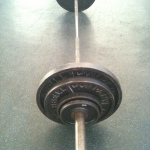
Recent Comments